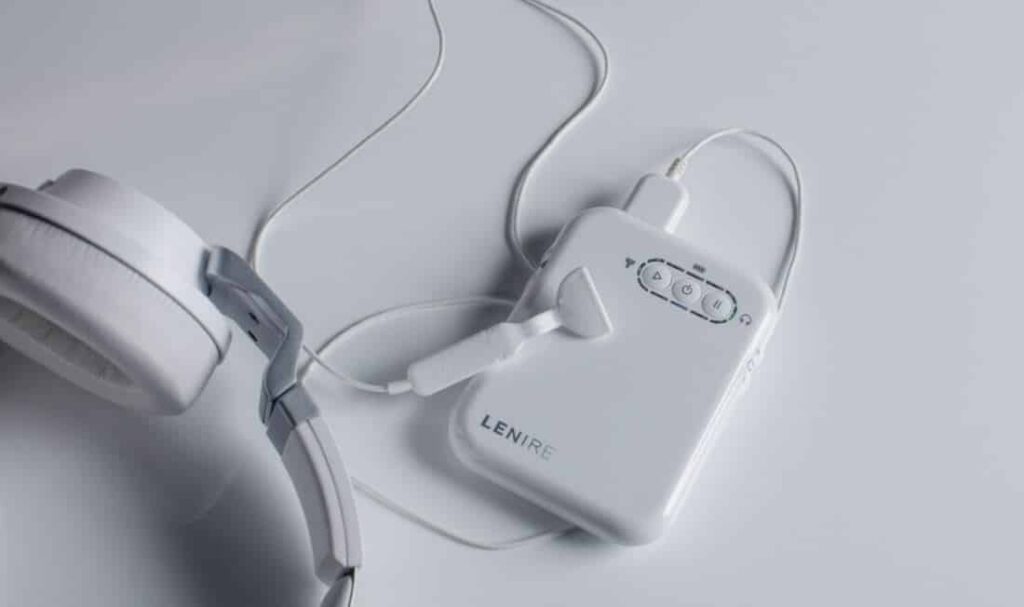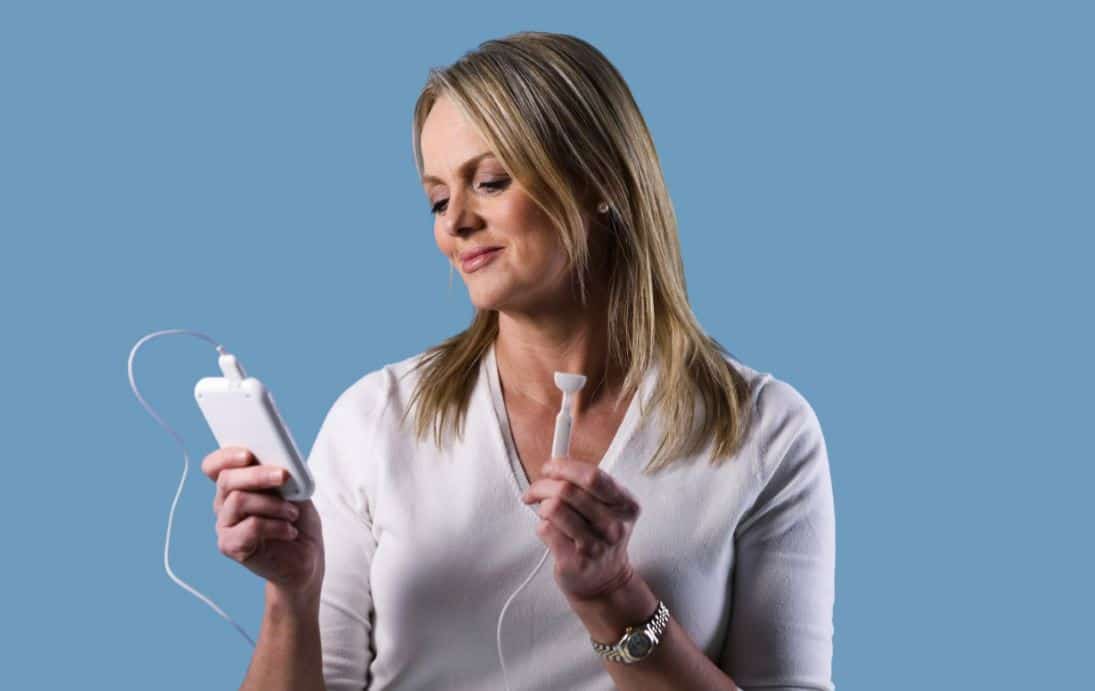COPENHAGEN, DENMARK — Irish medical device company, Neuromod Devices Ltd., which specializes in the treatment of tinnitus has reached an agreement with Specialklinikken Borgå ApS, Denmark’s longest established provider of private care for tinnitus, to make its Lenire device available in Denmark.
Lenire is a bimodal neuromodulation device which has shown in clinical trials to reduce the symptoms of tinnitus. Tinnitus, commonly known as “ringing in the ears”, is a complex neurological condition resulting in the perception of sound without an external source. It’s thought to affect 10-15% of the adult population globallyi.
Landmark research into the prevalence of tinnitus in Europe was published in renowned scientific journal, The Lancet, in late 2021. It found that prevalence significantly increased with increasing age and worsening of hearing status. It also found that healthcare resource use for tinnitus increased with increasing tinnitus symptom severityii. These findings were consistent with The Danish National Health Authority’s 2017 National Health Report which found the prevalence of tinnitus in the country to be 12.7%, a 25% increase from 10.1% in 2010, and that prevalence increased with increasing ageiii.
Through this distribution agreement, Specialklinikken Borgå’s specialist team has exclusive licence from Neuromod to provide Lenire, throughout Denmark, to suitable patients for the treatment of their tinnitus.
“I’m proud that by working with Specialklinikken Borgå we can make Lenire available to people living with tinnitus in Denmark. Tinnitus is globally recognised as a significant healthcare challenge and many people living with the condition have unmet clinical needs. By partnering with tinnitus specialists like Specialklinikken Borgå we’re aiming to improve therapeutic outcomes for these people”
–Dr. Ross O’Neill, Founder and CEO of Neuromod Devices
The agreement comes following Lenire’s launches in Norway and Spain earlier in 2022 and the publication of an independent real-world study demonstrating the safety and efficacy of the Lenire device for improving symptoms in tinnitus patients. The study found that 85% of tinnitus patients experienced a reduction in their tinnitus symptoms, as measured by THIiv, following six to 12 weeks of treatment using Lenirev. The results were recently published in the highly ranked scientific journal, Brain Stimulation.
The device has also been used in large-scale clinical trials with over 500 patients. The first of these clinical trials, involving 326 participants, was published in October 2020 as the cover story in the internationally renowned journal Science Translational Medicine and reported improvements in patients’ tinnitus symptoms. 86.2% of treatment-compliant participants reported an improvement in their tinnitus symptoms, measured by THI, after a 12-week treatment periodvi. When followed up with 12 months post treatment, 80.1% of treatment-compliant participants had sustained the improvementsvi. This study represents one of the largest and longest followed-up clinical trials ever conducted in the field of tinnitus devices.

In June 2022, the results of a second large-scale clinical trial of Lenire were published in Nature – Scientific Reports reporting greater average improvement in tinnitus symptoms than the first trial due to optimised treatment plans for participantsvii. 95% of treatment-compliant participants reported an improvement in their tinnitus symptomsvii.
To coincide with the introduction of Lenire to the Danish market, Specialklinikken Borgå ApS is hosting a roadshow of tinnitus seminars throughout Denmark for people living with tinnitus. The roadshow begins in Aarhus with further events in Middlefart, Skive, Odense, Copenhagen, Aalborg, and Esbjerg throughout July and August. Further details about each seminar and tickets are available at https://borgaa.com/.
“I’m delighted that Specialklinikken Borgå are partnering with Neuromod so we can provide an evidence-based treatment option that has seen encouraging patient outcomes in large-scale clinical trials and in the real world. I’m especially looking forward to our roadshow of tinnitus seminars to provide people with tinnitus an opportunity to discuss the breakthrough Lenire treatment”
–Thomas Borgå, CEO at Specialklinikken Borgå
Lenire is a bimodal neuromodulation device which combines mild electrical pulses to the tongue with sound stimulation to drive neuroplasticity in the brain which reduces the symptoms of tinnitus. It has CE-mark certification for the treatment of tinnitus under the supervision of an appropriately qualified healthcare professional and is currently available throughout Europe.
The device consists of Bluetooth® headphones which play customised sounds to activate the auditory nerve, a proprietary intra-oral device which provides mild electrical stimulation to the surface of the tongue, known as a Tonguetip®, and a controller which controls the duration and intensity of treatment with the device.
The device’s sound and electrical stimuli can be calibrated to suit a patient’s tinnitus after an initial assessment of their condition which includes an audiological exam. The supervising healthcare professional demonstrates how to use the device and provides the patient with instructions for use. Subsequently, patients use Lenire for 60 minutes per day typically for at least 10 weeks. Follow-up visits with the healthcare professional occur during treatment to monitor patients’ progress.
At the end of the prescribed treatment plan, the healthcare professional advises the patient about their continued use of Lenire.
About Neuromod Devices Ltd
Founded in 2010, Neuromod Devices Ltd. is a medical technology company headquartered in Dublin, Ireland. Neuromod specialises in the design and development of neuromodulation technologies to address the clinical needs of underserved patient populations who live with chronic and debilitating conditions. The lead application of Neuromod’s technology is in the field of tinnitus, where Neuromod has completed extensive clinical trials to confirm the efficacy of its non-invasive neuromodulation platform in this common disorder. Neuromod’s tinnitus treatment device, Lenire, is currently available throughout Europe. For more information visit www.neuromoddevices.com.
About Specialklinikken Borgå ApS
Specialklinikken Borgå, founded in 2001, is Denmark’s longest established treatment centre for private tinnitus care. The centre is based in Skive, offers in-patient and telehealth services, and provides a number of treatment interventions across a range of health conditions.
About Lenire
Lenire is the first non-invasive bimodal neuromodulation tinnitus treatment device shown to soothe and relieve tinnitus in a large-scale clinical trial. Lenire has CE-mark certification for the treatment of tinnitus under the supervision of an appropriately qualified healthcare professional in Europe. Further details about Lenire including a list of providers can be found at www.lenire.com.
References
(i) Baguely et al., Tinnitus, The Lancet (2013), https://www.sciencedirect.com/science/article/pii/S0140673613601427
(ii) R. Biswas et al., Tinnitus prevalence in Europe: a multi-country cross-sectional population study, The Lancet Regional Health (2021), https://doi.org/10.1016/j.lanepe.2021.100250 (iii) Danskernes Sundhed – Den Nationale Sundhedsprofil, Danish Health Authority, www.sst.dk
(iv) THI or Tinnitus Handicap Inventory is a clinical standard for measuring the impact of tinnitus on someone’s day-to-day life. Measured on a scale of 100, the higher the score, the greater the impact of tinnitus. Reducing a person’s THI score should correspond to improved quality of life by reducing how their tinnitus is affecting them.
(v) Buechner A, Lesinski-Schiedat A, Becker P, Lenarz T, Real-world clinical experience with bimodal neuromodulation for the treatment of tinnitus – A case series, Brain Stimulation (2022), doi: https://doi.org/10.1016/j.brs.2022.01.022. (vi) Conlon et al., Sci. Transl. Med. 12, eabb2830 (2020)
(vii) Conlon et al., Different bimodal neuromodulation settings reduce tinnitus symptoms in a large randomized trial, Sci Rep, https://doi.org/10.1038/s41598-022-13875-x (2022






